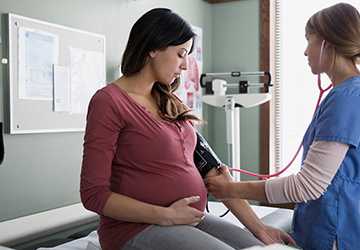Pregnancy-induced hypertension affects up to 10% of pregnant women worldwide. Although it's a serious condition, if not properly managed, it poses a significant threat to both mother and child.
Gestational hypertension and preeclampsia, which are classified as PIH, have potential risks, including premature birth, low birth weight, and, in severe cases, death of the mother and child.

These factors are essential in ensuring that pregnancy is healthy and that complications arising from them are detected early.
If women with PIH practice good antenatal care and adhere to proper management of the condition, they can minimize complications resulting from this condition and improve their chances of having a healthy pregnancy and baby.
In this post, we'll explore some tips for managing pregnancy-induced hypertension. It would help if you learned more about the causes, associated signs, and available treatment procedures to manage your health during this period better.
PIH is a condition that can be effectively managed. Here are some measures to help you control PIH and have a healthy pregnancy for you and your baby.
Clients with PIH should be examined and monitored through frequent prenatal appointments. These appointments also enable your doctor to check your blood pressure and perform other physical examinations to establish whether any complications must be addressed.
● As advised by your healthcare provider, you should schedule routine appointments often.
● Assess and record blood pressure and any other vital signs on each visit
● Share any problem regarding your health with your doctor, even if it is just a mere discomfort
Prenatal care involves constant or routine checkups to ensure the mother and her child are in proper condition throughout the pregnancy.
Diet is central to controlling PIH since it involves balancing the intake of various nutrients to avoid imbalances that can lead to complications from this condition.
It is wise to pay attention to the type of foods you include in your diet. You should strive to include foods with nutrients essential for your health and that of your unborn baby.
● Daily meals contain fruits, vegetables, whole grain products, and lean meats.
● Minimize your salt consumption to check your blood pressure because too much sodium can cause high blood pressure.
● Drinking water should be done daily to ensure the body is hydrated properly.
Increased blood pressure is controlled through the intake of foods rich in nutrients that help the fetus and maternal bodies grow.
Exercise plays a crucial role in the health of pregnant women, particularly in preventing pregnancy-induced hypertension (PIH).
Aerobic exercises can help lower blood pressure, relieve stress, and manage weight without requiring high-impact activity.
● Pregnant women should opt for low-impact exercises that do not exert pressure on joints, such as walking, swimming, and prenatal yoga.
● Moderate exercise is recommended for at least 30 minutes on most days.
● Given your health status, you should only embark on any new exercise routine after consulting your doctor to determine whether it is safe.
This not only aids in controlling high blood pressure but also impacts mood, decreases anxiety, and assists the body in preparing for labour and delivery.
Stress management is a crucial factor in controlling PIH. Since stress leads to high blood pressure, regularly practising stress management techniques can help mitigate this issue.

● Utilize stress management techniques like active or progressive muscle relaxation, breathing exercises, or meditation.
● Ensure you get enough sleep and rest, as exhaustion will likely worsen stress and ill health.
● Avoid stress as much as possible and, if necessary, seek help from friends, family, or even a professional.
Managing stress effectively will also help control high blood pressure, improve moods, and find the right way to deal with stress during pregnancy.
In some cases, medications may be necessary to address this condition effectively. Your healthcare provider should assess your symptoms, examine your medical history, and decide on the best treatment.
● To maintain stable blood pressure, you should also adhere to your doctor's advice on medication if this means taking antihypertensive drugs.
● Strictly stick to the dosage prescribed by the doctor and the number of times one is required to take the drugs.
● Inform your healthcare provider of any side effects or issues as soon as possible, as they may need to change your therapy strategy.
Appropriate antenatal care is essential to manage hypertension and keep it within healthy levels to afford the best protection from developing adverse consequences for both the mother and the baby.
Proper monitoring and responding to the situation at home are crucial components of managing PIH.
Self-monitoring puts the patient in an active position to manage their condition, providing them with the necessary tools to track blood pressure and symptoms.
● Take a record of your BP levels and any signs you notice, for instance, headaches or swelling of the limbs.
● Develop a daily schedule incorporating regular healthy activities and practices that maintain the health of your body.
By continuously observing your symptoms and implementing regular health maintenance measures, you can present the required data to your care providers and actively manage your health status during this critical period.
This form of hypertension can be a threat to your health as well as the well-being of your baby, so it is essential to monitor and control it.
With these effective strategies in place, you are in a position to prevent or manage various complications posed by PIH during your pregnancy.
Do not become complacent and neglect your health. You can give your baby the best chance by practising these tips. You will be comforted knowing you are doing everything possible to keep the PIH at bay.
Act now and take those first steps to ensure you get and enjoy a healthy pregnancy!
Q. How often should I check my blood pressure during pregnancy?
Ans. Monitor your blood pressure according to your healthcare provider's instructions; this should be done each time you attend a prenatal appointment. People with PIH may need to check their blood pressure more often at home to ensure it is within a healthy range.
Q. What foods should I avoid to manage PIH?
Ans. Avoid salty foods like processed chips, soups in cans, and fast foods, as they are high in sodium—concentration on a diet with increased consumption of fruits, vegetables, whole-grain products, and low-fat proteins.
Q. What are the signs that my PIH is worsening?
Ans. Some signs that indicate that the PIH is getting worse include things such as having severe headaches, blurred vision, abdominal pain, and sudden swelling in the face, hands, or feet. If you experience any of these signs, it is crucial to consult your doctor.


